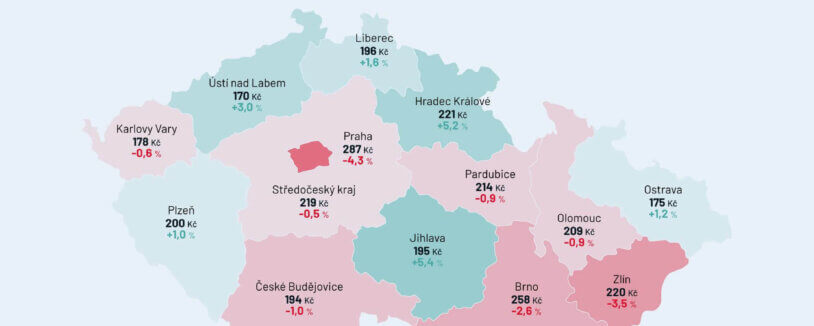Rental properties
Rental property is becoming increasingly popular. Whether it’s a short or long term rental, it always pays to have a carefully drafted rental agreement to protect both parties. Rental apartments are considered a secure investment, but more and more people are also interested in long-term rental housing for themselves. A landlord wants to guard their property as much as possible while still wanting to make a profit. The tenant, on the other hand, wants the cheapest property with the greatest degree of freedom. Renting is actually letting someone else use a particular property, but for a fee. Although the Czechs are gravitating towards ownership type of housing, rental housing is still and will be a more popular and preferable form of housing for a part of the population. Even renting a house is no longer an exception. Moreover, the interest in it has been growing recently. However, renting an apartment, renting a house or just renting a room should not be underestimated. Nobody wants to live in a precarious home without a lease, even if it is with a relative they know. We certainly cannot recommend it. Renting a house is increasingly common today, not only as an investment but also as a way of living for families who don’t want to or can’t finance their own property.
Apartment lease agreement – what should it look like?
When entering into an apartment lease agreement, it is always crucial to define the exact subject of the lease, the amount of rent and the period of time for which the contract is agreed. The law says that a tenancy agreement should always be in writing. The requirements of a tenancy agreement are as follows:
- Identification of the parties: the lease must contain the name or specifications of the landlord and the tenant. You should have all the details verified, especially if you do not know the persons you are dealing with. It should also include the permanent residence of both parties, preferably with their birth or ID numbers. You can also include any contact details that may be useful (e.g. email).
- Subject of the lease: the more specific you are, the better. This should include details from the Land Registry, i.e. the plot number, address, specific floor or exact layout and area of the property. Tenants should not forget to ask the landlord for proof of ownership (extract from the Land Registry).
- Payment of rent and methods of payment: one of the most important questions is definitely the amount of rent. Both the tenant and the landlord should find out what the rent is locally It is also important to determine whether the rent will include, for example, the amount of sewage, cleaning of common areas, gas deposits and so on. Don’t forget the due date. You can also specify the frequency or how the payment will be made. Rent is usually paid monthly in arrears.
- Rental period: It is important to specify in the lease agreement the period for which the lease is agreed. If the term is not explicitly stated, it is automatically agreed for an indefinite period.
- Other rights and obligations of the tenant and landlord: This can be a very problematic part of what a lease should contain. You may be thinking “simple tenancy agreement”, there is nothing wrong with that. But the lease agreement should also contain information that specifies as closely as possible the condition of the apartment and the items in it that are part of the lease. Therefore, it may include photo documentation, an exact list of the leased fixtures and fittings, the condition of the meters or the number of keys to be handed over. This inventory is particularly useful when handing back the apartment. For example, it is often forgotten to clarify the obligation to paint the apartment. The contract may also already contain contractual penalties.
- Termination of the lease: Here it depends on the agreement between the parties whether they put it in the contract on a specific date or for an indefinite period. The rules on possible termination are particularly important.
- Final provisions: The signature and the date on which the contract comes into force must not be missing.
Are you solving a similar problem?
Rental property
We will make sure that renting an apartment or other real estate is done without legal complications. We will draw up or check the lease agreement for the property and advise you on how to terminate or extend the lease. You can only pay after the service has been provided.
I want to help
- When you order, you know what you will get and how much it will cost.
- We handle everything online or in person at one of our 6 offices.
- We handle 8 out of 10 requests within 2 working days.
- We have specialists for every field of law.
Rent a garage or maybe a long term cottage rental
Rentals are not just about apartments or houses to live in. You can contract to rent a garage, rent a cottage or rent a cottage. A separate garage lease is often negotiated in cities where there is a shortage of parking spaces, and even in this case a written contract is required. For long-term and short-term rentals of holiday properties, such as cottages or chalets, all the same requirements apply as for a flat rental agreement.
Remember to include how any damage to belongings will be dealt with. You will also need to include in the contract the cost of water, electricity, gas or firewood used. It is better to include really everything in the contract including the security deposit, cleaning, the total capacity of people in the property.
Cottage rentals and cottage rentals can be an interesting investment for landlords. Likewise garages if they are in good and populated locations. It is common that garages do not come with the land underneath. This can either be municipal or belong to another private party. This also needs to be taken into account in the lease agreement. However, cottage owners also encounter this. The lease agreement for the land under the cottage solves this problem.
Lease of a cooperative flat – sublease agreement for a cooperative flat
We have describedhow to rent a flat in so-called private ownership above, but how to rent a cooperative flat? If you have a co-operative flat, or are a shareholder in a co-operative, you yourself have a tenancy agreement with the co-operative as you do not own the flat personally.
If you do not live in the flat and are thinking of renting it out, this is usually possible. However, it will technically be a sublet. First of all, find out what the bylaws of your co-op say. You may be surprised, but the right to sublet a co-operative flat will be right there in the statutes, otherwise you will have to ask for approval from the co-operative’s statutory bodies.
Apartment sublease agreement
Unlike a lease contract, a sublease or room rental contract has no specific rules, as the law does not say what its elements should be. If you are looking for a universal model sublet agreement, there is no need. This is because it always depends on how the tenant and the subtenant or subtenants agree.
In general, however, we recommend that both parties specify their rights and obligations in as much detail as possible to avoid misunderstandings in the future. Therefore, always remember that the sublease agreement must contain a precise definition of the apartment or part of the apartment to be rented, if you will only occupy a room, the rent and the services to be provided, including their due dates.
And how to sublet non-residential premises?
According to the new Civil Code, we no longer use the term non-residential premises per se, but talk about the lease or sublease of premises used for business purposes. Thus, it is a space or a room whose purpose is to carry out a business activity, this space serves at least predominantly for business, regardless of the purpose of the lease or sublease expressed in the contract.
Are you solving a similar problem?
We can help you with renting a property
Do you need help with a lease agreement or other apartment rental-related matters? Do not hesitate to contact us. We have many years of experience in renting real estate. We will be happy to use them in solving your case.
I'm interested in helping
- When you order, you know what you will get and how much it will cost.
- We handle everything online or in person at one of our 6 offices.
- We handle 8 out of 10 requests within 2 working days.
- We have specialists for every field of law.
Lease of non-residential premises and lease of land
How to rent non-residential space i.e. often office space or renting space used for business? The legal treatment of renting non-residential premises for business purposes is somewhat different and distinct from renting a dwelling for residential purposes. If the tenant is running a business, the tenancy will be governed by the rules on the lease of business premises. The rules for a business lease differ in many ways from a general lease.
What are the specific differences?
For example, the notice period is different or the rules for negotiating the contract are different. As a landlord, you should also know about the obligation to pay the tenant compensation for taking over the customer base at the end of the lease. However, this can be addressed in the contract.
Above all, it is important to pay attention to the negotiation of the lease itself. Make sure that the purpose of use is correctly agreed. In fact, the lease agreement for non-residential premises should contain information that you may use the premises for the purposes of your business. This is good for the reason that, in principle, the tenant should not use the premises for a different purpose, or even for a completely different type of business than what was agreed in the contract.
What is the normal rent for non-residential premises? It is a good idea for both the landlord and the tenant to study the normal rental price fornon-residential premises before entering into a lease agreement. Price maps of individual towns and cities can help, showing the average price by location. The most desirable locations in the centre are usually the most expensive.
In fact,the lease of agricultural land or land lease does not have to be dealt with in a classic lease agreement at all. Usually it is a so-called lease. A lease is an obligation where the lessor undertakes to give the lessee the right to use and enjoy the leased property in return for a rent.
The word enjoy is important. Why? Because the usufructuary is not only entitled to use the thing, but also to the fruits and benefits of such thing. Thus, you may have come across situations where an agricultural lease or a pond lease is entered into . Indeed,a tenancy agreement is most often concluded in the context of agriculture or garden leases, but it can also be for a quarry, a restaurant or a water source.
Change of property owner and lease
A change of property owner is not in itself a reason to terminate a lease of a flat or other property. It is true that some terms of the lease may change. For example, provisions of the lease that the tenant and the original landlord negotiated outside the law and that the new landlord did not know about are not binding on the new landlord. Therefore, if the tenant has managed to negotiate superior terms with the original landlord, the tenant should take care to ensure that the new landlord has demonstrable prior knowledge of these terms so that they remain in place. It will be sufficient if the lease itself is available.
What about the transfer of the lease? Transfer of the lease is indeed possible, practical and lawful. Assignment of the lease is used in situations where the owner wants to transfer the concerns of the lease to a third party. This third party is put in the position of the landlord after the assignment of the lease. However, the tenant must agree to this.
Vehicle rental contract
A lease agreement does not have to be for an apartment, house or garage. Anything can be rented. An example is a vehicle lease agreement, this is commonly used, for example in companies. We often talk about so-called operating leases. The lessor is obliged to hand over all the necessary documents to the lessee together with the vehicle.
The vehicle must be fit for operation and normal use. If this is not the case, the lessee has the right to take possession of the means of transport or to request that the defect be rectified. The hirer is obliged to maintain the means of transport in the condition in which he took it over, taking into account normal wear and tear.
Summary
The lease agreement is a key document that protects both the lessor and the lessee and should always be in writing. It must contain a precise identification of the parties, a detailed definition of the subject of the lease (e.g. according to the Land Registry), the amount and method of payment of rent including utilities, the duration, the rights and obligations of both parties (including the condition of the apartment, furnishings or photo documentation), the terms of termination of the lease, any penalties and final provisions with signature. The specifics apply to different types of leases – for cooperative apartments it is technically a sublease, for non-residential premises it is a lease for business purposes with different rules (e.g. notice periods or compensation for customer base), for land it is often a lease with the right to use and enjoy the fruits, and for vehicles it is for example an operating lease. A lease does not terminate on a change of ownership if the contract is properly negotiated, and can even be assigned to a third party with the consent of the lessee. To prevent disputes, it is always advisable to include as many details as possible in the contract, from the security deposit to the method of utility payments to the rules for maintenance or handover of the property.
Frequently Asked Questions
What elements must be included in the lease agreement when renting an apartment?
The lease agreement for the rental of a dwelling should contain the identification of the tenant and the landlord, the exact definition of the dwelling, the amount of rent and services, the duration of the lease and the conditions for its termination. It is also advisable to attach an inventory of amenities or photo documentation.
Is it possible to arrange a short-term rental of the house?
Yes, you can rent the house for a short period of time, but a written rental agreement is also required. The contract should specify not only the amount of the rent, but also how the house will be used and the conditions for maintenance or return of the property.
How to find good apartments for rent and what to look out for?
When looking for apartments for rent, it is important to look not only at the price, but also at the location, the condition of the apartment and a fair lease agreement. Tenants should check the landlord with the Land Registry and know all rights and obligations before signing the contract.
Do I need a lease for the garage?
Yes, even a garage lease should be confirmed by a written lease agreement. This should include the definition of the garage, the amount of rent, the duration of the lease and information about the use of common areas such as the driveway







